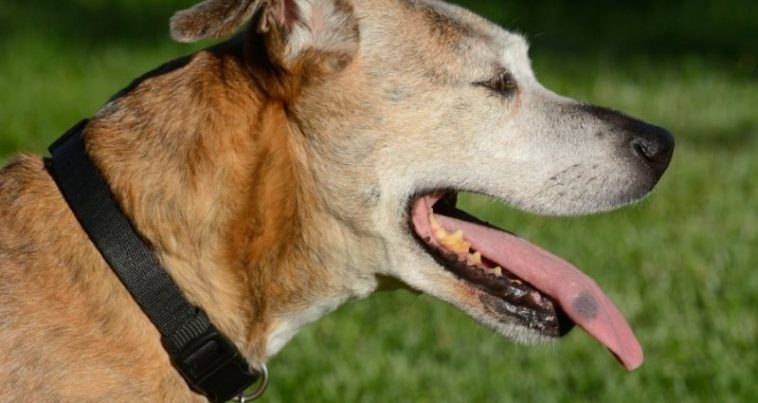“Why does my dog have a spotted tongue?” Although it may surprise you, in reality there is really nothing mysterious about the spotted dog tongue.
Because Chow Chows have blue black tongues, many people think that their Shepherd may have some mixed breed in their history. It’s possible, but more often than not it’s a different explanation.
Spotted Dog Tongues: Myths, Wives Tales & Misinformation
Table of Contents
What is the truth about spotted dog tongues? What dogs have spotted tongues? There are a number of myths or ‘old wives tales’ about what it means:
Proof of Pure Blood Lines – Or Not
There are a few common and popular conflicting beliefs that black spots on the tongue are 1) an indication of a purebred German Shepherd or Chow dog, or 2) an indication that a dog is not a purebred. The fact is, it has absolutely nothing to do with either of these factors.
It’s The Chow’s Fault
Chows have all-blue tongues – it’s simply a characteristic of the breed. Because of this, it it commonly believed that dogs with black spots on their tongue have some Chow blood in their background. Tongue spots on a dog are simply pigmentation spots, similar to human birthmarks.
Illness
Although it can be disconcerting for dog owners to see a black spot developing on their dogs tongue, it is not a sign of illness. However, tongue spots are black/blue, so spots with any other color, an odor, a changing shape or raised shape should be investigated by your veterinarian.
Why Do Dogs Have Spotted Tongues?
Just like freckles are birthmarks, some dogs have them and some dogs don’t.
The melanin that causes the black spots on a Shepherds tongue is the same pigment that is responsible for the dog’s black hair and dark skin. Melanin is produced by special cells called melanocytes. These cells create melanin granules, which are then transferred to other cells in the skin. The amount of melanin in the skin determines a person’s skin color.
People with darker skin have more melanin in their skin than people with lighter skin. Dogs with black fur have more melanin in their fur than dogs with white fur. And dogs with black spots on their tongues have more melanin in their tongues than dogs without them.
The melanocytes that produce melanin are also present in the lips of dogs, the pads of their feet, and the toenails. That’s why some dog breeds can get dark spots on their lips (e.g., Chow Chows) or inside their foot-pads (e.g., black spots in Great Danes).
The different types of melanin that can cause spots on a dog’s tongue are:
Eumelanin
Eumelanin is the most common type and is responsible for black and brown pigmentation.
Pheomelanin
Pheomelanin is a weaker type of melanin that causes reddish-brown pigmentation.
Neurmelanin
Neurmelanin is a rare type of melanin that can cause blue or gray spots on a dog’s tongue.
What is melanin?
Melanin is a pigment produced by the cells that give your dog’s skin, hair, and eyes their color. It can also be found in structures called melanosomes which are located at the bottom of the dog’s hair shafts.
Melanosomes contain both eumelanin and pheomelanin, and when the two types mix together they create different color variations such as black, brown, dark gray, light gray, and blue. When there is only one type of melanin present it creates a dog with jet black or very dark brown fur.
Which Dog Breeds Have A Spotted Tongue?
There are a number of dog breeds that are more prone to getting black spots on their tongues. Bulldogs, for example, are particularly prone to this problem. Other breeds that are susceptible to black spots on their tongues include the American Cocker Spaniel, the Bichon Frise, and the Boston Terrier. If your dog has a dark tongue, it’s important to keep an eye on it and make sure that any black spots are checked by a veterinarian.
There are literally dozens of dog breeds that have spots on their tongues, including:
- Aeirdale
- Akita
- Australian Cattle Dog
- Australian Shepherd
- Belgian Sheepdog
- Belgian Malinois
- Bichon Frise
- Bull Mastiff
- Cairn Terrier
- Chinese Shar Pei
- Collie
- Cocker Spaniel
- Dalmatian
- Doberman Pinscher
- English Setter
- German Shepherd
- Golden Retriever
- Great Pyrenese
- Irish Setter
- Labrador Retriever
- Mastiff
- Newfoundland
- Pomeranian
- Pug
- Rhodesian Ridgeback
- Rottweiler
- Siberian Husky
- Tibetan Mastiff
Do Dogs With Black Tongue Spots Require Special Care?
There is no special care that is required for a dog with a black spot on its tongue. However, it’s important to keep an eye on the spot and make sure that it doesn’t change in size or appearance. If you notice any changes, take your dog to the veterinarian for a check-up.
Conditions That Can Cause A Black Spot On Your Dog’s Tongue
There are many potential causes of a black spot on the tongue. Some of these include:
- Bacterial infections (common in dogs that like to chew and lick at their tongues)
- Blistering (a symptom of sunburn)
- Sarcoid tumors
- Coated tongue (a symptom of diabetes or hyperthyroidism)
- Tongue ulcers
If your veterinarian diagnoses your dog with a black spot on its tongue, they will likely recommend that the area be biopsied to determine the exact cause. Once the root of the problem has been identified, your veterinarian can better treat it. This may involve treating the underlying cause (such as a bacterial infection) or removing the spot surgically.
Tongue Spots & Your Dog’s Overall Health
In general, tongue spots on your dog can mean a few things for their overall health.
For one, it could be indicative of some sort of fungal infection. If this is the case, your dog will likely also exhibit symptoms such as a bad odor coming from their mouth, excessive drooling, and difficulty swallowing. If you notice any of these symptoms in your dog, it’s important to take them to the veterinarian as soon as possible.
Tongue spots can also be a sign of oral cancer in dogs. If you notice any lumps or bumps on your dog’s tongue, or if the spots are changing in size or color, it’s important to have them checked out by a veterinarian immediately. Oral cancer is a very serious matter, and it can be both costly and time-consuming to treat.
Other conditions that could cause tongue spots on your dog include anemia or other kinds of blood-related diseases. If you notice any other symptoms in addition to the spots (i.e., other color changes, bleeding, etc.) you should definitely take your dog to the veterinarian as soon as possible.
Final Thoughts
You may not even know your puppy has a spotted tongue until they are a little older. So, don’t panic, get it checked out if you feel it’s not right, but most importantly, relax and enjoy his/her unique appearance. Spend time with your pup and enjoy every moment!
Sign up for our AllDogg newsletter and stay up-to-date on working dog information, gear and more! (Be sure to follow us on Facebook and Pinterest!)


